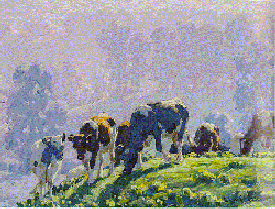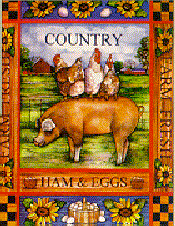 Myths and
Stereotypes about the Family Farm
Myths and
Stereotypes about the Family Farm Myths and
Stereotypes about the Family Farm
Myths and
Stereotypes about the Family Farm
In a country with few of its citizens active in family farming, there exist ideas, images and beliefs about the American family farm. Through interviews with farmers, community members and students in Knox County, the Family Farm Project has identified three central themes to help understand the American myths and stereotypes surrounding the family farm.
 Farming is an Easy Way of Life
Farming is an Easy Way of Life
 Family Farming is Inefficient and Outdated
Family Farming is Inefficient and Outdated
 All Family Farming Follows the Same Model
All Family Farming Follows the Same Model

This painting by Ohio Impressionist Edward Volkert (1873-1935) creatively depicts the beauty of the farm but, to the non-farmer, the image may only show the aesthetic qualities of the farm, leaving out any indication of the labor and care required to maintain a farm. This farm has no "dirt."
Wendell Berry, a farmer, poet and philopsopher from Kentucky, makes the distinction between the words "scenery" and "land." Berry says that by seeing the land as scenery people make it into an object---somethig separate from themselves. Farmers, on the other hand, are unable to see the farm simply for its beauty because they are so connected to the land and the farm operations. Berry writes about his sense of connection to the land.
Marcia Brown, of Knox County, didn't grow up on a farm but married a farmer. She recalls how her perceptions about farming changed as a result of living and working on a family farm. "I thought farming was a very slow-paced life [laugh]. I am so pooped from this slow pace!" Similarly, a New York City native and former Family Farm Project participant commented on her perceptions about farming changed after having spent time with many farm families. "I didn't think that the days were as long as they were and that as much work went into farming as it does. I just thought 'it's beautiful,' and 'it must be great to live on a farm.' I didn't realize that there are also a lot of difficulties."
a student from The Family Farm Project reflect on
what she learned about the nature of families and farm work:

One of the primary difficulties that many people do not realize
about farming is that
it can be dangerous. Farm children
learn very early to stay away from
certain machinery for their safety and for their parent's safety.
Farming accidents occur no matter how
cautious a family may be. Injuries and even death are a part of the
work considerations for the farmer.
Because of the dangerous nature of farming, family farmers often rely on
each other and their families for help when injured.
Finally, farming is a full-time job. Farmers cannot just leave for a vacation and have someone
else take up their responsibilities. Ron Elliott, a dairy farmer from Gambier, says, "I don't think that we've
had a good vacation for at least two or three years. We've only had a few days here and there--but just get up and go
somewhere different? No." Don Hawk, a turkey farmer from Howard Township, also explains the daily responsibility of being a farmer.
"On a day-to-day basis, the turkeys are a 365 day operation---there are always turkeys on the farm. And that includes doing
chores, the necessary chores each and every morning and each and every evening."
The
typical daily chores on a family farm
require a firm understanding of a variety
of related areas: mechanics, economics, land-use, veterinary
medicine, business, biology, government regulations and
computers. For these reasons, it is a myth that farming is an "easy" job
requiring few skills to be successful.

Another so-called economic externality is community life. Family farming communities, characterized by owner-operated farms, often help each other in times of need. Because of the competitive nature of large national companies, they do not have the same kinds of ties to the local community and are less likely to share knowledge and help with one another in the same way that locally owned businesses and family farms are more inclined to do. Farm economies based on a multiplicity of family farms breeds a climate of cooperation and community values. Generally, large-scale, absentee-owned businesses and farms do not consider the effect they have on the local society because they are simply not an integral part of all aspects of the community.
Finally, "efficiency" is inextricably linked to the ideology that bigger is always better. Many family farmers and economists would agree that the quality of the management is more important than the quantity of land and/or livestock that the farm holds. Responsible, thoughtful farming is ultimately more important than size. As Ron Elliott, a dairy farmer from Gambier, expresses,"The most profitable farm is that farm that has good management ... Profit comes from management decisions ... [Y]ou have to call the shots and then hope for the best."
Family farming may not be outdated and a relic from the past
if we consider how efficient this method of agricultural organization
is in dealing with the very issues the marketplace deems external to the
issue of production. Efficiency is all in how you define it.

The labor within the family also varies according to the farm. Knox County has farms with male proprietors, female proprietors, husband and wife partnerships, and parent and child partnerhsips. Regardless of the offical organization, all members of the family farm work together to make the farm a success. Becky Shinaberry, of a Fredericktown sheep and beef farm, says that although her husband and father-in-law are the main proprietors of the operation, it is still very much a family effort. "So, it's more of a team, family effort where all of us seem to do a lot of the same kinds of things and help each other out." Finally, there is a prominent Amish population in Knox County who organize and operate their farms differently than the non-Amish population.
Dan Hathaway, a dairy farmer from , comments on the farm community of Knox County, "There's many good
farms in the county. Each of them runs at a different level, for different reasons. You know, each has
their own ideas about where they want to be."


 E-Mail The Family Farm Project
E-Mail The Family Farm Project